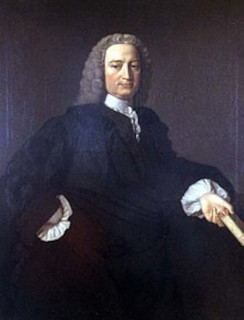 Francis Hutcheson, Scotch-Irish philosopher and major exponent of the theory of the existence of a moral sense through which man can achieve right action, is born on August 8, 1694 in Saintfield, County Down, Ulster. He is remembered for his book A System of Moral Philosophy. He is an important influence on the works of several significant Enlightenment thinkers, including David Hume and Adam Smith.
Francis Hutcheson, Scotch-Irish philosopher and major exponent of the theory of the existence of a moral sense through which man can achieve right action, is born on August 8, 1694 in Saintfield, County Down, Ulster. He is remembered for his book A System of Moral Philosophy. He is an important influence on the works of several significant Enlightenment thinkers, including David Hume and Adam Smith.
The son of a Presbyterian minister, Hutcheson is educated at Killyleagh in modern day Northern Ireland and studies philosophy, classics, and theology at the University of Glasgow (1710–1716). While a student, he works as tutor to William Boyd, 3rd Earl of Kilmarnock. Following his return to Ireland, he founds a private academy in Dublin in 1719 and teaches there for ten years. In 1729 he returns to Glasgow to succeed his old master, Gershom Carmichael, as Professor of Moral Philosophy at the University of Glasgow, a position he holds until his death.
Hutcheson is licensed as a preacher in 1719 by Irish Presbyterians in Ulster, but in 1738 the Glasgow presbytery challenges his belief that people can have a knowledge of good and evil without, and prior to, a knowledge of God. His standing as a popular preacher is undiminished, however, and the celebrated Scottish philosopher David Hume seeks his opinion of the rough draft of the section “Of Human Morals” in Hume’s A Treatise of Human Nature.
Hutcheson’s ethical theory is propounded in his Inquiry into the Original of Our Ideas of Beauty and Virtue (1725), in Essay on the Nature and Conduct of the Passions and Affections (1728) and Illustrations upon the Moral Sense (1728), and in the posthumous A System of Moral Philosophy (1755). In his view, besides his five external senses, man has a variety of internal senses, including a sense of beauty, of morality, of honour, and of the ridiculous. Of these, Hutcheson considers the moral sense to be the most important. He believes that it is implanted in man and pronounces instinctively and immediately on the character of actions and affections, approving those that are virtuous and disapproving those that are vicious. His moral criterion is whether or not an act tends to promote the general welfare of mankind. He thus anticipates the utilitarianism of the English thinker Jeremy Bentham, even to his use of the phrase “the greatest happiness for the greatest number.” Hutcheson is also influential as a logician and theorist of human knowledge.
Hutcheson spends time in Dublin, and dies while on a visit to the city on August 8, 1746, his fifty-second birthday. He is buried in the churchyard of Saint Mary’s, which is also the final resting place of his cousin William Bruce. Today Saint Mary’s is a public park located in what is now Wolfe Tone Street. He lies in what is now an unmarked grave in the Dublin he loved and where his best work was done.
